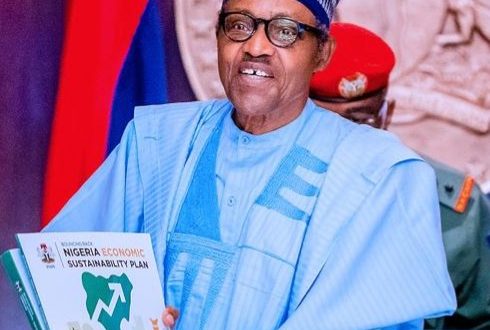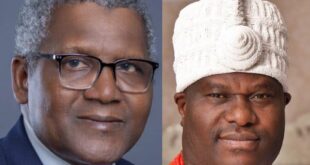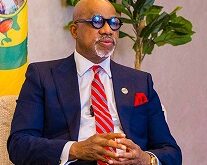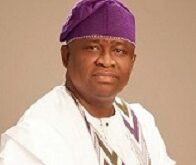
ABUJA: The Vice President of Nigeria, Prof. Yemi Osinbajo (SAN), has on behalf of the members of the Economic Sustainability Committee presented a report titled: “Bouncing Back” to President Muhammadu Buhari on Thursday, June 11, 2020.
Recall, in early days of the emergence of COVID-19 crisis, President Buhari constituted a crisis committee headed by the Hon. Minister of Finance, Budget and National Planning to look at what the impact of the COVID-19 pandemic might be on the budget and the economy.
Subsequently, on the 30th of March, 2020, in response to the threat of the most severe economic downturn in our Nation’s history, largely caused by the COVID-19 pandemic, Buhari directed his Vice to chair the Economic Sustainability Committee (ESC), with other members.
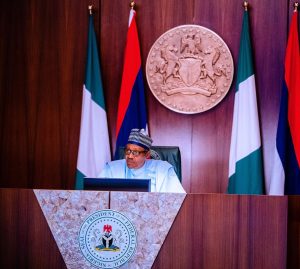 Read full text of the presentation below:
Read full text of the presentation below:
Statement by H.E. Vice President, Prof. Yemi Osinbajo on the Occasion of the Presentation of the Economic Sustainability Plan to President Muhammadu Buhari
June 11, 2020
Your Excellency, Mr. President
Honourable Ministers
Secretary to the Government of the Federation
Chief of Staff to the President
Governor of the Central Bank of Nigeria
Group Managing Director of the Nigerian National Petroleum Corporation
Ladies and Gentlemen
Mr. President, in the very early days of the emergence of the COVID-19 crisis, you constituted a crisis committee headed by the Hon. Minister of Finance, Budget and National Planning to look at what the impact of the COVID-19 pandemic might be on the budget and the economy. Subsequently, on the 30th of March, 2020, in response to the threat of the most severe economic downturn in our Nation’s history, largely caused by the COVID-19 pandemic, Your Excellency directed me to chair the Economic Sustainability Committee (ESC), with the following members:
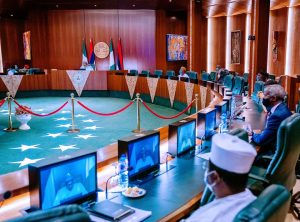 (i) Hon. Minister of Finance, Budget & National Planning;
(i) Hon. Minister of Finance, Budget & National Planning;
(ii) Hon. Minister of State, Budget and National Planning;
(iii) Hon. Minister of Industry, Trade & Investment;
(iv) Hon. Minister of Labour and Employment;
(v) Hon. Minister of State, Petroleum Resources;
(vi) Governor of the Central Bank of Nigeria;
(vii) Group Managing Director of NNPC; and
(viii) Permanent Secretary in the Cabinet Office – Secretary.
2. In view of the envisaged scope of engagement, we later co-opted the following Ministers:
(i) Hon. Minister of Agriculture & Rural Development;
(ii) Hon. Minister of Humanitarian Affairs, Disaster Management & Social Development;
(iii) Hon. Minister of Works & Housing;
(iv) Hon. Minister of Aviation;
(v) Hon. Minister of Communication & Digital Economy;
(vi) Hon. Minister of Education;
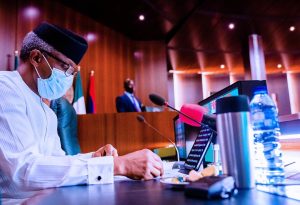 (vii) Hon. Minister of Health;
(vii) Hon. Minister of Health;
(viii) Hon. Minister of Interior;
(ix) Hon. Minister of Science & Technology; and
(x) Hon. Minister of Transportation.
3. Our Terms of Reference were to:
(i) Develop a clear Economic Sustainability Plan in response to challenges posed by the COVID-19 pandemic;
(ii) Propose monetary policy measures in support of the plan;
(iii) Provide a Fiscal/Monetary Stimulus Package, including support to private businesses (with emphasis on strategic sectors most affected by the pandemic) and vulnerable segments of the population;
(iv) Identify fiscal measures for enhancing distributable oil and gas revenue, increasing non-oil revenues and reducing non- essential spending, towards securing sufficient resources to fund the plan;
(v) Articulate specific measures to support the States and FCT;
(vi) Propose a clear-cut strategy to keep existing jobs and create opportunities for new ones; and
(vii) Identify measures that may require legislative support to deliver the Plan.
4. We consulted and received Memoranda from:
(i) Members of the Presidential Economic Advisory Council.
(ii) The 36 State Governors; and
(iii) Leadership of the National Assembly.
5. We also took into account existing government policies and strategies, including the following:
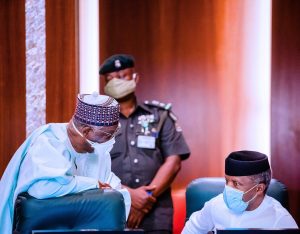 (i) The Economic Recovery and Growth Plan (ERGP)
(i) The Economic Recovery and Growth Plan (ERGP)
(ii) Report of the Economic Crisis Committee (headed by the Hon. Minister of Finance, Budget & National Planning)
(iii) The Finance Act 2019;
(iv) Central Bank of Nigeria (CBN) proposals; and
(iv) The National Economic Council Report on the COVID-19 Crisis.
6. Mr. President, the Economic Sustainability Committee was motivated by your directive to come up with a Plan that would provide succour to Nigerians, taking into account the dangers posed to the economy by the global economic slowdown, which also resulted in a drastic fall in crude oil production and prices, with serious implications for government revenues and foreign exchange earnings.
7. In addition, the inevitable mandatory lockdowns and social distancing measures put in place to curb the spread of COVID-19 have had a severe negative impact on farms and factories, as well as on trade, transport and tourism. Several projections, including those done by the National Bureau of Statistics (NBS) on behalf of the Economic Sustainability Committee, showed:
(i) a severe downturn in our oil earnings, as a result of which, even with oil price at 30 dollars a barrel, we would still have a shortfall of about N185 billion every month, in the amount available for allocation to the three tiers of Government;
(ii) that Unemployment may rise to 33.6% or about 39.4 million people by the end of 2020, if we fail to take prompt preemptive measures;
(iii) that millions more will fall extreme Poverty, before the pandemic ends;
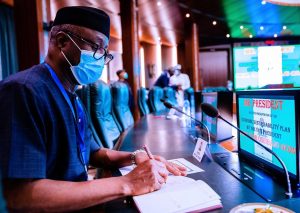 (iv) that GDP may fall to between minus 4.40% and minus 8.91%, depending on the length of the lockdown period and strength of our economic response.
(iv) that GDP may fall to between minus 4.40% and minus 8.91%, depending on the length of the lockdown period and strength of our economic response.
8. So we decided on a strategy hinged on Mr. President’s mantra to “produce what we eat and consume what we produce”. In other words, to create millions of new jobs, we need to focus on encouraging local production, local services, local innovation, and emphasize the use of local materials. Nigeria and Nigerians can produce our food, build our houses and construct our roads, using local materials in all cases. If we must import, it must be to support local production. We have therefore recommended that we must carry out mass programmes that create jobs and utilise local materials. Such will include:
(i) A Mass Agricultural Programme, which is expected to bring between 20,000 and 100,000 hectares of new farmland under cultivation in every State of the Federation and create millions of direct and indirect job opportunities.
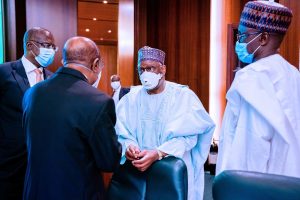 (ii) Extensive Public Works and Road Construction Programme focusing on both major and rural roads and using locally available materials like limestone, cement and granite.
(ii) Extensive Public Works and Road Construction Programme focusing on both major and rural roads and using locally available materials like limestone, cement and granite.
(iii) Mass Housing Programme to deliver up to 300,000 homes annually, engaging young professionals and artisans who form themselves into small and medium scale businesses within the construction industry, using indigenous labour and materials.
(iv) Installation of Solar Home System, targeting 5 million households, serving about 25 million individual Nigerians who are currently not connected to the National Grid.
9. We have also recommended –
(i) support for local production and manufacturing of all that is possible, including tech apps, software, shoes, garments, steel fabrication, ceramics and furniture, with the required capital and essential machinery.
(ii) the provision of ample support for the informal sector through low interest loans and by easing procedures for registration, licensing, obtaining permits, etc. By these means, urban and informal business people like mechanics, tailors, artisans, and petty traders, will be encouraged to improve and develop their services.
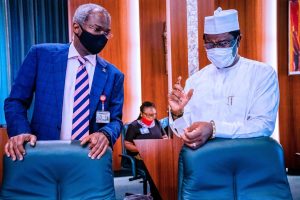 (iii) Support for MSMEs, especially in assisting to restructure their loans with banks. Among others, this will assist businesses in the pharmaceutical, aviation, hotels and the hospitality industry, private schools, road transportation, technology companies, and the creative industry, amongst others.
(iii) Support for MSMEs, especially in assisting to restructure their loans with banks. Among others, this will assist businesses in the pharmaceutical, aviation, hotels and the hospitality industry, private schools, road transportation, technology companies, and the creative industry, amongst others.
(iv) Facilitation of broadband connectivity across the country and creation of a wide variety of technology and ICT jobs.
(v) Expansion of the Social Investment Programme, through an increase in the number of cash transfer beneficiaries, N- Power volunteers and sundry traders enjoying small and micro loans through the MarketMoni and TraderMoni schemes. The pre-existing conditional cash transfer will also be extended to cover a larger number of the extremely poor.
10. The key to the success of this plan is undoubtedly ‘implementation’. Making sure that we execute the Plan faithfully and working in collaboration. We have therefore recommended that each Minister will be responsible for supervising the implementation of plans situated in their respective Ministries. Ministers will also be responsible for ensuring synergy between all relevant stakeholders across the public and private sectors. The Economic Sustainability Committee, which is inter-Ministerial 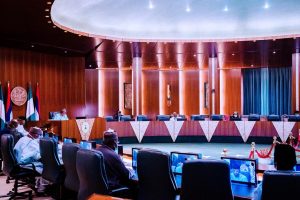 in nature, should only then remain to oversee plan implementation, ensure inter ministerial co-ordination, and report regularly to the President, while expenditure is monitored through the National Monitoring & Evaluation framework and the Budget Office of the Federation.
in nature, should only then remain to oversee plan implementation, ensure inter ministerial co-ordination, and report regularly to the President, while expenditure is monitored through the National Monitoring & Evaluation framework and the Budget Office of the Federation.
11. In conclusion, I wish to thank you, Mr. President, for the confidence reposed in members of the ESC by giving us this very critical national assignment. We are confident that if the proposals are taken as a whole and implemented conscientiously, Nigeria will avert the worst of the impending economic headwinds, and covert this crisis to a victory for the Nigerian economy. Mr. President, may I now on behalf of members of the Economic Sustainability Committee, present this Plan, entitled “Bouncing Back: The Nigerian Economic Sustainability Plan” to Your Excellency for your kind consideration and approval.
 Startrend International Magazine For Your Latest News And Entertainment Gists
Startrend International Magazine For Your Latest News And Entertainment Gists


